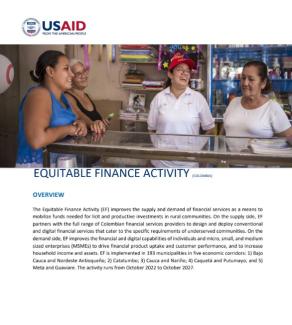OVERVIEW The Equitable Finance Activity (EF) improves the supply and demand of financial services as a means to mobilize funds needed for licit and productive investments in rural communities. On the supply side, EF partners with the full range of Colombian financial services providers to design and deploy conventional and digital financial services that cater to the specific requirements of underserved communities. On the demand side, EF improves the financial and digital capabilities of individuals and micro, small, and medium sized enterprises (MSMEs) to drive financial product uptake and customer performance, and to increase household income and assets. EF is implemented in 193 municipalities in five economic corridors: 1) Bajo Cauca and Nordeste Antioqueño; 2) Catatumbo; 3) Cauca and Nariño; 4) Caquetá and Putumayo; and 5) Meta and Guaviare. The activity runs from October 2022 to October 2027. GOALS INCREASE FINANCIAL CAPACITY EF improves the financial literacy and capacity of producers, cooperatives, students and educators, women, rural residents, indigenous and Afro-Colombian communities, and MSMEs. Strengthened financial capacity enables these actors to better understand and access the different financial services available to them. INCREASE FINANCIAL SERVICE PROVISION EF increases the supply of fit-for-purpose financial services in target municipalities. It does this by enabling financial service providers, financial technology firms, producer organizations, and other private sector actors to increase their presence, capacity, and ability to provide digital and traditional financial services. IMPROVE FINANCIAL INCLUSION EF promotes access to, and use of, data among governmental and private financial intermediaries to drive evidence-based policy and improve the development of financial channels, products, and services for target communities. MOBILIZE LONG-TERM FINANCIAL CAPITAL EF improves the flow of funds into prioritized geographies by providing alternative finance instruments needed to access and use long-term capital from financial institutions, development banks, and other public and private investors. ANTICIPATED RESULTS ● Increase MSMEs’ financial capacity; ● Enhance regulatory framework for financial inclusion; ● Improve collection and use of financial consumer data; ● Increase financial capacity among community members; ● Improve the provision of digital services by financial providers; ● Enhance the provision of financial services in target communities; and ● Mobilize long-term financial capital toward USAID’s priority sectors.
| Contact Information |
|---|
| Sharon Benrey E-mail: Sharon_Benrey@dai.com |
(281.2 KB)

